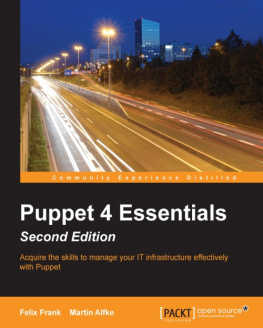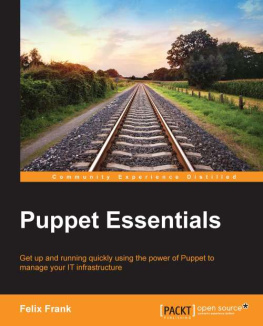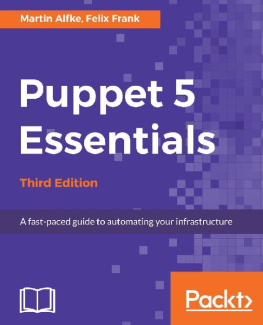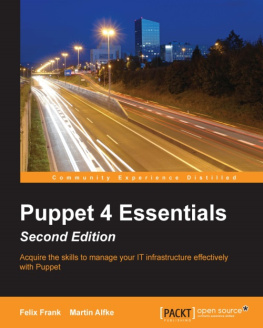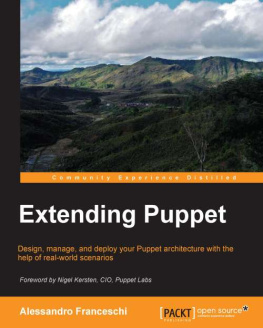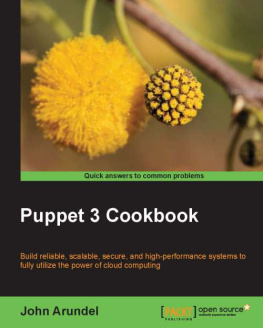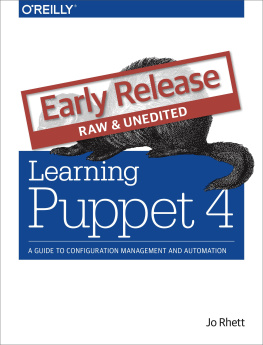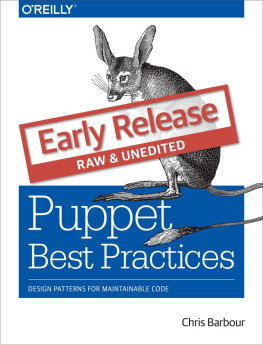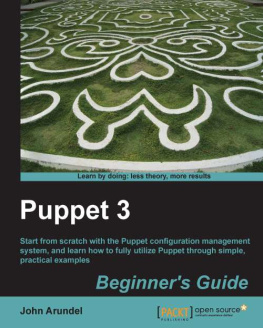About the Authors
Felix Frank has used and programmed computers for most of his life. During and after working on his computer science diploma, he gained experience on the job as a systems administrator, server operator, and open source software developer. He spent 6 years of his 11-year career as a Puppet power user. In parallel, he spent about two years intensifying his studies through ongoing source code contributions and active participation in several conferences.
For making this title possible in the first place, and for their ongoing support, I'd like to thank my editors, Nadeem Bagban and Arwa Manasawala. Also, this book would not be what it is without the amazing feedback from my reviewers.
For their kind feedback and ongoing support, I'd also like to thank a number of Puppet Labs employees: Michael Smith, Peter Huene, Josh Cooper, Andrew Parker, Adrien Thebo, Dawn Foster, Kara Sowles, Joshua Partlow, Henrik Lindberg, Charlie Sharpsteen, Nigel Kersten, Kylo Ginsberg, Ethan Brown, Rob Reynolds, Jeff McCune, and Eric Sorenson. Special thanks to Luke Kanies for creating Puppet and dedicating so many resources to this amazing community.
Further thanks go to Waltraut Niepraschk and the whole datacenter staff at DESY Zeuthen for getting me on track with the central management of UNIX servers. Thanks also to mpex for giving me the opportunity to learn a lot about Puppet, and ultimately, write this very book.
Martin Alfke is co-founder and CEO of example42 GmbH. He is a Puppet and automation enthusiast since 2007. In the past, he would have said he is a "system administrator". Nowadays, he likes the term "infrastructure engineer". The big difference is that system administrators sshs into systems to fix them, whereas infrastructure engineers fix their automation.
Martin is serving as a Puppet Labs' training partner in Germany since 2011, conducting official Puppet training. In his spare time, he likes reading books and visiting interesting locations.
About the Reviewer
Ger Apeldoorn is a freelance Puppet consultant and teaches official Puppet Labs courses in the Netherlands. He has helped many companies implement Puppet (both Open Source and Enterprise), and has conducted talks at PuppetConf, PuppetCamps, FOSDEM, and other conferences. You can go through his official website at http://puppetspecialist.nl.
www.PacktPub.com
Support files, eBooks, discount offers, and more
For support files and downloads related to your book, please visit www.PacktPub.com.
Did you know that Packt offers eBook versions of every book published, with PDF and ePub files available? You can upgrade to the eBook version at > for more details.
At www.PacktPub.com, you can also read a collection of free technical articles, sign up for a range of free newsletters and receive exclusive discounts and offers on Packt books and eBooks.
https://www2.packtpub.com/books/subscription/packtlib
Do you need instant solutions to your IT questions? PacktLib is Packt's online digital book library. Here, you can search, access, and read Packt's entire library of books.
Why subscribe?
- Fully searchable across every book published by Packt
- Copy and paste, print, and bookmark content
- On demand and accessible via a web browser
Free access for Packt account holders
If you have an account with Packt atwww.PacktPub.com, you can use this to access PacktLib today and view 9entirely free books. Simply use your login credentials for immediate access.
Preface
The software industry is changing and so are the related fields. Old paradigms are slowly giving way to new roles and shifting views on what the different professions should bring to the table. The DevOps trend pervades more and more workflows. Developers set up and maintain their own environments. Operations raise automation to new levels and translate whole infrastructures to code.
A steady stream of new technologies allows for ever-evolving, more efficient organizational principles. One of these is Puppet. Its fresh take on server configuration management caused a rapid adoption and distribution throughout the industry. In the few years of its existence, Puppet has managed to rally thousands of users who employ it in numerous contexts to achieve manifold results. While it is not the only configuration management system available, it is certainly the most widespread by now.
From its specialized language, to the system that makes it work, Puppet has innovated and rapidly conquered. Its extendible structure, paired with a large and helpful community, has made Puppet a powerhouse of easy configuration. The more well known a software is, the greater the chance that Puppet will deploy and configure it out of the box.
Puppet's own learning curve is not sharp, and the available documentation is not only extensive, but also of high quality. Nevertheless, even experienced programmers and administrators can face difficulties at some point. Advanced use may require the navigation of some intricacies that stem from Puppet's unique modeling approach.
This book aims to impart all the knowledge required to tap into not only the basics of Puppet, but also its core. The very ideas and principles of Puppet-based designs are explored and explained. Sophisticated tooling is presented to enable efficient and productive use. The reader is rapidly introduced to and familiarized with a whole range of Puppet-centric technology.

